AMD Radeon HD 7950 Review Feat. Sapphire & XFX: Sewing Up The High-End Market
by Ryan Smith on January 31, 2012 9:02 AM ESTOverclocking: Power, Temp, & Noise
In their marketing materials AMD is heavily pushing overclocking, and they have good reason to. With the 7970 we’ve established that Tahiti has quite a bit of overclocking headroom, and as the 7950 is clocked lower by default this opens up that headroom even further. Realistically AMD’s binning process means that the best clocking Tahiti GPUs are going to be allocated to the 7970 unless they have failed shaders, but even with that there’s quite a bit of potential on paper.
As with overclocking the 7970, our goal overclocking the 7950 is to see how much you can get for free; that is without any voltage adjustments. AMD’s reference PCBs are not particularly overbuilt for overclocking—cards like that will come later—so sticking to the reference voltage is the safest option, not to mention the easiest. With the 7970 we were able to get 200MHz (22%) overclocks without any voltage adjustment, and we’re hoping for the same out of the 7950.
With that said, we quickly ran into a wall on one card: the Sapphire 7950. Sapphire’s low VID of 0.993v may be great for temperature and noise at stock, but it’s not doing overclocking any favors. We only hit 950MHz at that voltage. As the Sapphire was the odd man out—every other card was at 1.093v—we did end up overvolting the Sapphire to 1.093v to see what it was capable of when put on similar footing as the rest of our cards.
After bringing up the voltage of our Sapphire card, all of our 7950s ended up overclocking to very similar levels. Our Sapphire and AMD cards topped out at 1025MHz core, a 225MHz (28%) overclock over a stock 7950 and a 125MHz (14%) overclock over the Sapphire’s factory overclock, while our XFX card reached 1050MHz, a 150MHz (17%) overclock beyond XFX’s factory overclock. Meanwhile the memory clocks on all of our cards topped out at 5.8GHz, beyond which we’d start seeing performance regressions from error correction on the memory bus.
| Radeon HD 7950 Overclocking | |||||
| AMD Radeon HD 7950 | Sapphire HD 7950 Overclock Edition | XFX R7950 BEDD | |||
| Shipping Core Clock | 800MHz | 900MHz | 900MHz | ||
| Shipping Memory Clock | 5GHz | 5GHz | 5.5GHz | ||
| Shipping Voltage | 1.093v | 0.993v | 1.093v | ||
| Overclock Core Clock | 1025MHz | 1025MHz | 1050MHz | ||
| Overclock Memory Clock | 5.8GHz | 5.8GHz | 5.8GHz | ||
| Overclock Voltage | 1.093v | 1.093v | 1.093v | ||
As you can imagine, with such similar overclocks, gaming performance on all 4 cards ended up being very similar. So we’ll get to gaming performance in a minute, while we’ll start with power, temperature, & noise.
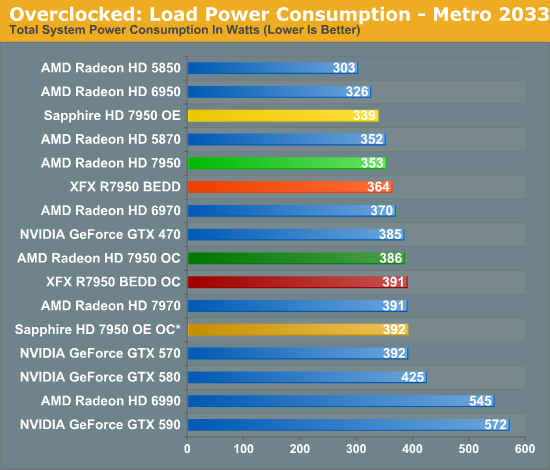
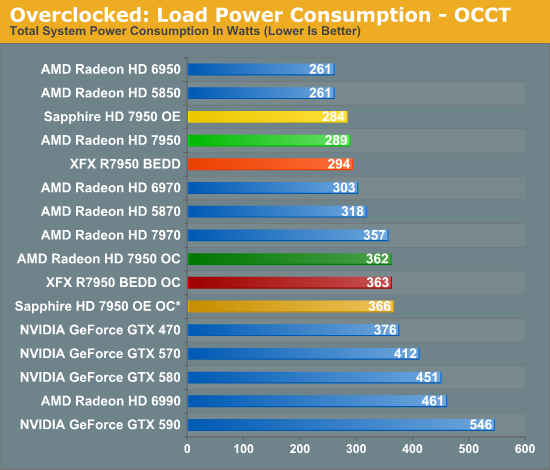
Even though we’re not increasing the voltage on our AMD and XFX cards, merely overclocking them and raising the PowerTune limit to avoid throttling does drive the power consumption up. As is typical with heavily overclocked cards, overclocking quickly drives up power consumption and the 7950s are no exception. After overclocking power consumption is almost identical to the stock 7970, so while you can get 7970 performance you still need to pay the price with 7970 power consumption. Meanwhile it’s interesting to note that even with the extra 0.1v we’ve given the Sapphire card its final power consumption is only ever so slightly higher than the other 7950s, proving that voltage is the great equalizer in this case.
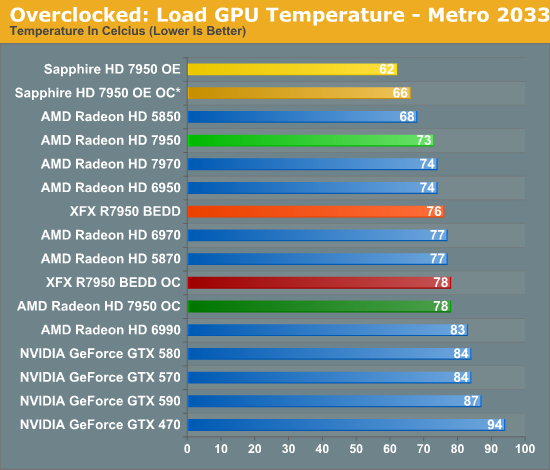
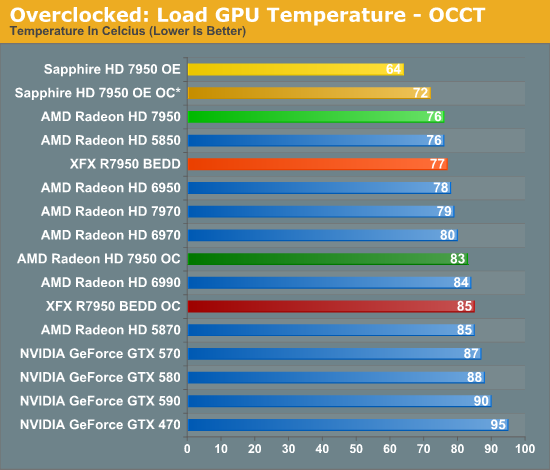
With the increase in power comes an increase in temperatures. The Sapphire card still does very well here staying in the low 70s even under OCCT, while the reference and XFX cards hit the high 70s under Metro and mid 80s under OCCT. As we’ve yet to really ascertain what the thermal limits are for Tahiti, it’s not clear whether there’s too much thermal headroom left for the GPU, particularly under OCCT.
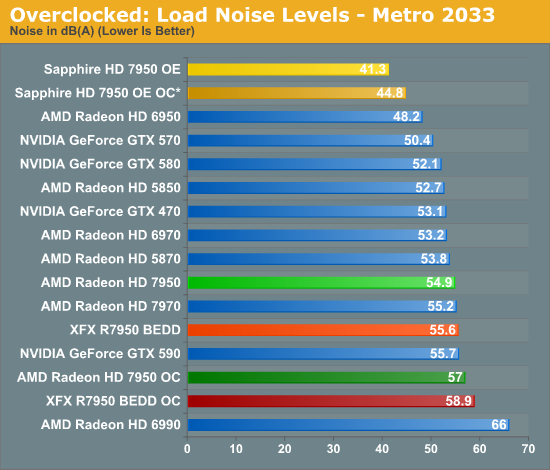
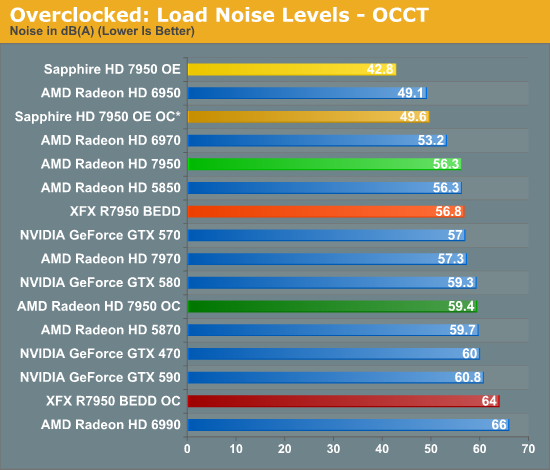
Last but not least we have load noise. The Sapphire card is once more a stellar performer, and we still can’t get it above 50dB even with OCCT. Unfortunately the XFX 7950 BEDD has its biggest fallout yet—it may be able to overclock well, but at 64dB under OCCT the performance isn’t going to be worth the immense amount of noise it creates to move enough air to keep the GPU cool.










259 Comments
View All Comments
chizow - Sunday, February 5, 2012 - link
No its not my standard, its the standard for what the market will bear using historical data points as my evidence.Buts its fine, its clear illogical and irrational people such as yourself don't have any standard to determine buy decisions, which is fine too.
Ignorance is bliss.
Galidou - Sunday, February 5, 2012 - link
LOL ultimate knowledge is crazyness...Galidou - Sunday, February 5, 2012 - link
I'm not saying at ANY time that the pricing is super right, that it is the right thing to do, I'm just saying from the beginning that it isn'T the worse that ever happened while you're making a freaking case of it.Galidou - Sunday, February 5, 2012 - link
And btw, the freaking card is around 75-90% faster than a 6950 which isn't bad. Nothing amazing but... That gtx 280 was around 65% to 100% faster than a 8800gt(2 gen below gtx2xx series).Galidou - Sunday, February 5, 2012 - link
Whenever any card came out there was already a part that was an x2 card more powerful and cheaper that what was actually out there, what'S new today?JNo - Thursday, February 2, 2012 - link
@chizow,You keep writing like AMD couldn't adjust their prices after Kepler's launch. Also, you do realise that AMD isn't competing with nvidia's 580 from a year ago right? They are competing with it *right now*.
Well done if you bought the 580 a year ago but which card is better value today if you're a buyer? Right now the 7970 looks to be a better price performance proposition. If AMD's pricing makes the 580 look poor, nvidia are free to adjust their pricing but I'd go for the 7950 personally as it is right now.
And no point pre-judging AMD pricing based on a for 'after the Kepler launch' argmument. Just because nvidia haven't adjusted pricing downwards, doesn't mean AMD won't.
I'm not an AMD fan (I buy both camps) but your arguments don't make sense.
chizow - Thursday, February 2, 2012 - link
@JNoI'm not ignoring that possibility at all, I've actually alluded to the possibility on numerous occasions with my "when Kepler launches" comments. It hinges greatly on what Nvidia does of course and how Kepler performs but I don't think ANYONE expects Nvidia to introduce "next-gen" parts at last-gen performance levels because that's the ONLY way AMD's current pricing on these Tahiti parts will make sense. Why? Because they're basing next-gen pricing on last-gen performance.
Instead, what's most likely to happen based on historical pricing and performance metrics, Nvidia will release a new line-up that will completely shift the current market that effectively makes last-gen price/performance obsolete and establishing a new metric that will offer roughly +50% performance at the same price points. Again, mountains of historical evidence from both Nvidia and AMD back my point. This is what is expected from "Next-Gen" architectures on "Next-Gen" fabrication processes.
What AMD is doing here is cashing in short-term profits but ignoring long-term repercussions. As I stated in another comment, the people most likely to buy this product are AMD's most devout and loyal fans. IF they have to drop the pricing on these Tahiti parts because they were forced to so shortly after launch as a result of Nvidia's Kepler price/performance, how do you think these early adopters are going to feel? Their biggest fans are going to feel the biggest burn.
There is precedence for this with the GTX 280 launch. Nvidia did right by their customers by issuing rebate checks for $100-150 per card. Do you think AMD is willing to do the same? Just something to consider.
Sabresiberian - Tuesday, January 31, 2012 - link
People like you love to look at benchmark results that support their statements, and ignore the rest of them.Your statement is no more accurate than the statements of those that say the 7970 is barely faster than the GTX 580.
;)
swx2 - Thursday, February 2, 2012 - link
Are you listening to your self? did you just say that a overclocked 7970 (current gen card) is JUST NOW competitive with a last gen card? And you think that AMD has done well with this accomplishment?...what-is-this-i-don't-even...
Iketh - Tuesday, January 31, 2012 - link
Ladies and gentlemen, drugs are bad for you.